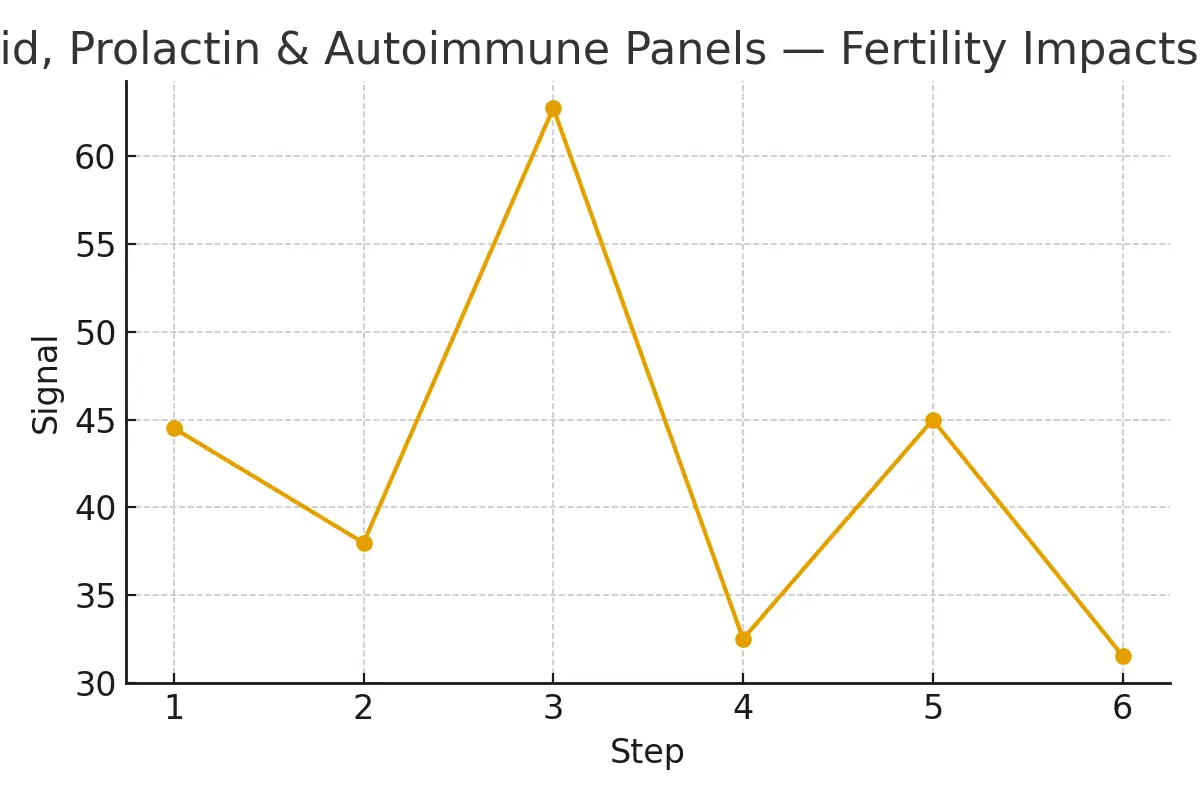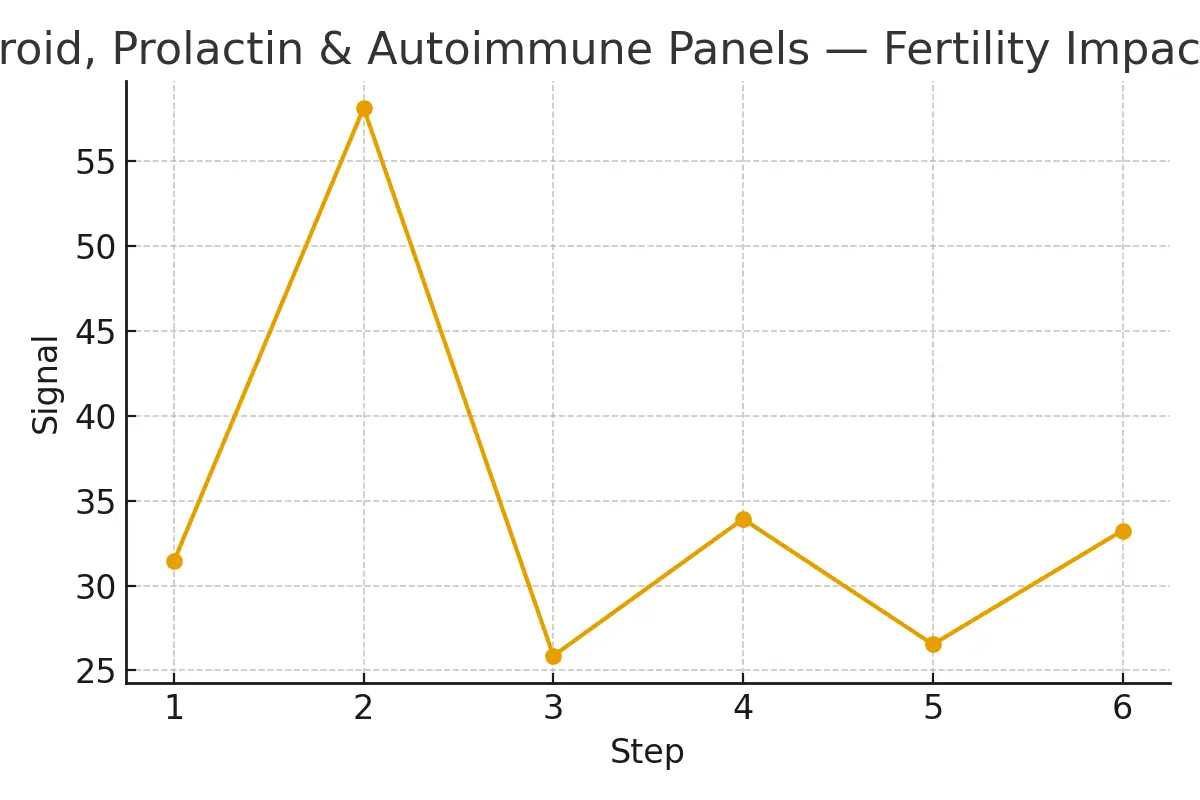
Understanding the Role of Hormonal and Immune Testing in Fertility Care
For couples and individuals exploring fertility treatment or IVF in NYC, understanding the impact of thyroid, prolactin, and autoimmune panels is essential. These diagnostic tests provide insight into how your body’s hormones and immune system influence conception, implantation, and pregnancy success rates. By identifying potential imbalances early, you can simplify your fertility journey, improve outcomes, and avoid unnecessary delays or costs
1. How Thyroid, Prolactin, and Autoimmune Factors Affect Fertility
Hormones and immune responses play a direct role in reproductive health. Even minor imbalances can disrupt ovulation, fertilization, or embryo implantation.
- Thyroid Panel: The thyroid gland regulates metabolism and influences reproductive hormones like estrogen and progesterone. An underactive thyroid (hypothyroidism) can cause irregular cycles or anovulation, while overactivity (hyperthyroidism) may affect embryo development and increase miscarriage risk.
- Prolactin Panel: Elevated prolactin levels can interfere with ovulation and luteal phase stability. Testing ensures that prolactin is balanced to support egg release and endometrial preparation.
- Autoimmune Panel: Some individuals produce antibodies that mistakenly target reproductive tissues or embryos, leading to implantation failure or early pregnancy loss. Identifying these markers helps tailor treatments to minimize immune interference.
Together, these panels give fertility specialists in NYC a clearer view of hidden causes behind infertility or recurrent IVF failure.
2. Where These Tests Fit in the Patient Journey
Most fertility clinics include thyroid, prolactin, and autoimmune panels early in the diagnostic phase, before beginning IVF or IUI cycles. For patients with prior unsuccessful attempts, repeat testing helps fine-tune future treatment plans.
Typical timeline in the fertility journey:
- Initial Consultation: Discuss menstrual history, prior pregnancies, and lifestyle factors.
- Baseline Testing: Includes thyroid, prolactin, AMH (egg reserve), and other hormonal assessments.
- Autoimmune Screening: Conducted if there’s a history of miscarriages or unexplained infertility.
- Treatment Planning: Adjust medications, doses, and protocols based on results.
By integrating these steps early, patients save time and improve predictability in their IVF journey.
3. Timing and Preparation
Timing matters for accurate results.
- Thyroid and Prolactin Tests: Ideally done in the follicular phase (Day 2–5 of your cycle).
- Autoimmune Tests: Can be taken any time during the cycle.
Fasting for 8–10 hours before the blood draw ensures consistent readings. Inform your provider about medications like steroids or birth control pills that might influence hormone levels.
4. Benefits and Limitations
Key Benefits:
- Detects reversible causes of infertility.
- Reduces failed IVF cycles due to unaddressed hormonal issues.
- Supports a personalized treatment approach for better outcomes.
Limitations:
- Results may vary with stress, illness, or medications.
- Additional confirmatory tests may be required.
- Some autoimmune markers lack standardized interpretations, requiring experienced clinical judgment.
However, when interpreted by a fertility expert, these tests significantly improve treatment accuracy and overall IVF success rates.
5. Cost Breakdown and Practical Considerations
Fertility testing costs in NYC vary depending on the clinic, insurance coverage, and test complexity. Below is a general overview:
Test Type estimated Cost (USD)
- Thyroid Panel (TSH, T3, T4) $75 – $150
- Prolactin Test $50 – $120
- Autoimmune Panel $200 – $500
- Specialist Consultation $150 – $250
Most fertility centers in NYC offer bundled diagnostic packages to make testing more affordable. Discuss these options early to avoid surprise expenses. Remember, accurate testing at the start prevents costlier complications later in your IVF journey.
6. How These Tests Improve IVF Success Rates
Abnormal thyroid or prolactin levels can reduce egg quality, affect ovulation timing, and cause implantation issues. Likewise, autoimmune activity can trigger rejection of embryos, even when they’re genetically healthy. Correcting these issues before IVF can:
- Improve ovarian response to stimulation
- Increase fertilization and implantation success
- Reduce miscarriage risk
- Enhance cumulative pregnancy rates across multiple cycles
At leading fertility clinics in NYC, clinicians emphasize balancing hormones before stimulation and suppressing unwanted immune responses during embryo transfer for optimal outcomes.
7. Expert Insight: Balancing Simplicity and Precision
“Protect timing and keep plans simple—quality improves when noise goes down.”
— Clinical Team, Fertility Specialists NYC
This quote reflects a guiding principle in fertility medicine: clarity and timing are just as important as advanced technology. Streamlining the testing process helps patients move forward with confidence and emotional balance.
8. Patient Case Example
A 35-year-old woman in NYC faced repeated IVF failures despite producing healthy embryos. Upon retesting, she was diagnosed with mild hypothyroidism and elevated prolactin. After three months of targeted treatment and adjusted stimulation protocol, her embryo transfer succeeded, leading to a full-term pregnancy.
This case demonstrates how early testing and tailored correction can transform IVF success rates and patient satisfaction.
9. Emotional and Practical Guidance for Patients
Fertility treatment can be overwhelming—emotionally, financially, and logistically. Understanding how these panels fit into your patient journey reduces uncertainty. Ask questions, request detailed cost breakdowns, and seek emotional support during testing and treatment. Every result contributes a piece to your fertility puzzle. With proper coordination between your endocrinologist and IVF specialist, small adjustments can make a big difference in long-term outcomes.
10. Partnering with Experts at Surrogacy4All
At Surrogacy4All, we understand that fertility care is more than medical testing—it’s about creating a pathway to parenthood with transparency and compassion. Our team partners with leading fertility specialists in NYC to integrate thyroid, prolactin, and autoimmune panels into personalized treatment plans. We focus on improving IVF success rates, optimizing costs, and ensuring every patient feels supported throughout their fertility journey.
Visit our Website profile today for guidance, a detailed cost breakdown, and a roadmap designed for your unique needs.
Frequently Asked Questions (FAQs)
Q. Why are thyroid, prolactin, and autoimmune tests important before IVF?
Ans. These tests identify underlying hormonal or immune issues that can lower IVF success rates. Correcting them improves embryo quality and implantation potential.
Q. How much do these fertility tests cost in NYC?
Ans. Costs vary between $300–$1,000, depending on panels and clinic policies. Many centers, including Surrogacy4All partners, offer bundled packages.
Q. Can thyroid or prolactin imbalance affect egg quality?
Ans. Yes. Imbalances can interfere with ovulation, follicle growth, and embryo development, impacting IVF outcomes.
Q. Are autoimmune problems common in infertility cases?
Ans. Around 10–20% of women with unexplained infertility show autoimmune activity. Proper diagnosis allows for targeted treatment and higher success rates.
Q. How soon can I start IVF after correcting hormonal or immune issues?
Ans. Most patients can begin within 6–12 weeks once levels stabilize and their specialist confirms readiness.

Dr. Kulsoom Baloch
Dr. Kulsoom Baloch is a dedicated donor coordinator at Egg Donors, leveraging her extensive background in medicine and public health. She holds an MBBS from Ziauddin University, Pakistan, and an MPH from Hofstra University, New York. With three years of clinical experience at prominent hospitals in Karachi, Pakistan, Dr. Baloch has honed her skills in patient care and medical research.






